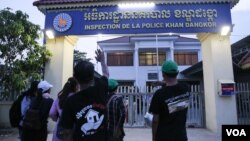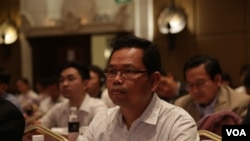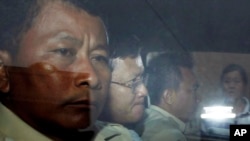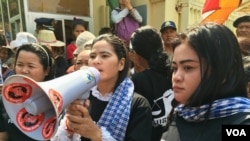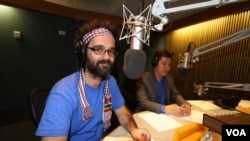Six people were arrested on Monday during rallies against the imprisonment last week of several rights workers and an election official on bribery charges.
Civil society groups organized the so-called Black Monday Campaign to protest the jailing of three staff members from local human rights group Adhoc and National Election Committee (NEC) deputy secretary general Ny Chakrya on May 1.
The Anti-Corruption Unit launched an investigation into allegations that the four had bribed the key witness in the body’s case against opposition Cambodia National Rescue Party deputy president Kem Sokha.
Sokha is alleged to have had an affair with the witness, Khom Chandaraty, also known as Srey Mom.
In Monday’s protests in the capital, Ee Sarom, executive director of Sahmakum Teang Tnaut and Thao Kimsan, deputy director of Licadho, were both among the detained.
The arrests were made as protesters attempted to march towards Prey Sar prison on the outskirts of Phnom Penh, where the four detained on bribery charges are being held.
The government claimed the protests were an attempt to foment a “color revolution” in the country – something Prime Minister Hun Sen’s administration has long argued was a foreign ploy aimed at ending his premiership.
Am Sam Ath, head of Licadho’s investigations unit, dismissed the claims.
“This is our right for freedom of expression of the people. But the restrictions have caused the human rights situation on Cambodia to deteriorate dramatically,” he said, adding that the color black was chosen as a motif for the campaign to show solidarity with the families of the detained.
Along with Chakrya of the NEC, four senior members of Adhoc’s staff were also jailed: Ny Sokha, chief investigator; deputy chief investigators Yi Soksan and Nay Vanda; and senior investigator Lim Mony.
Khuong Sreng, Phnom Penh deputy governor, said the security forces had moved to break up what he said was an illegal gathering.
“No matter what type of democracy you have everyone must work within the law and not outside it,” he said. “They strayed beyond legal limits; they are anonymous people causing chaos in society.”
The crackdown was widely condemned by civil society groups, both inside and outside of Cambodia.
A statement from Licadho on Monday said that four land rights activists from the Boeung Kak and Borei Keila areas were also detained and later released.
Tep Vanny, a prominent Boeung Kak Lake campaigner and evictee, said three activists – Bov Sophea, Kong Chantha and Song Sreyleap – were detained in Daun Penh district while attempting to join the march.
“No matter what happens, we can’t stop this activity calling for justice and the protection of our rights and freedoms,” she said.
A statement from Minister of Interior Sar Kheng said the authorities had detained six “ringleaders” and “defiant people”.
Separately, in Koh Kong province supporters of three detained environmentalists said they would join the Black Monday campaign next week to urge the authorities to release the activists, who have been in prison without trial since August.
Sun Mala, Try Sovikea and Sim Samnang of local NGO Mother Nature were arrested in August while taking part in a campaign against sand dredging in Koh Kong.
“We, civil society groups, still keep on appealing because the three activists did not commit any crime. Thus, we ask the court to speed up the trial for the release of the activists as soon as possible. The activists must be freed at all cost,” Sam Ath of Licadho said.
In April, deported Mother Nature founder Alex Gonzalez-Davidson called for the United Nations to intervene in the case.
Iv Tray, Koh Kong deputy prosecutor, could not be reached for comment.
In Kongchet, coordinator for Licadho in Koh Kong, said the demonstrators planned to peacefully gather dressed in black in support of the protests in Phnom Penh.
Government spokesman Phay Siphan compared the protesters’ actions and black dress code to the Khmer Rouge regime.
“Their decision to wear black is a big surprise for everybody since it’s the kind of color used in 1975 and cost more than two million lives. Those who wore that color came in the name of liberation and democracy and made people leave Phnom Penh. Wearing black is somehow related to this issue. Secondly, ISIS also wears that color,” he said.
Phav Nhoeung, a representative of Prek Chik village in Sre Ambel commune, dismissed the comparisons with the brutal agrarian communist government of the 1970s.
“We wear black today to call for the release [of those detained]. We just want to show that we don’t want to see the return to a situation like that during the Khmer Rouge regime,” she said. “This is not a color revolution.”
Koh Kong Provincial Governor Bun Leut said it was their right to protest and that the authorities would not interfere with the planned demonstration if it passed peacefully and without “impacting on public order”.
In March, university student Kong Raiya, 24, was sentenced to one and a half years in prison for “incitement” after he posted to social networking website Facebook asking Cambodians “who dares join this color revolution with me?”




